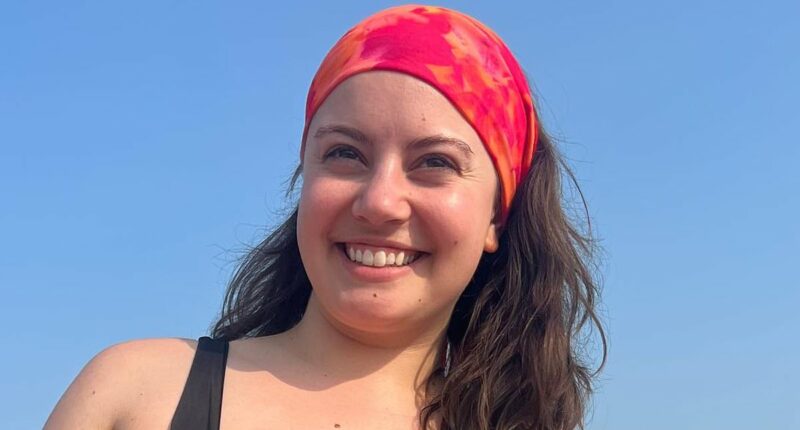Share this @internewscast.com
Autism spectrum disorder is traditionally associated with children, particularly young boys. Nonetheless, numerous adults are discovering that they have been concealing symptoms, even from themselves, for many years.
In the US, it is estimated that over 5 million adults either have an official autism diagnosis or suspect the condition in themselves.
Keara Graves, aged 26, believed she was suppressing potential autism indicators throughout her life due to fear and embarrassment. The Canadian podcaster mentioned that from early on, she convinced herself to overlook signs such as feeling overwhelmed by crowds and noises.
She expressed feeling an underlying dislike for herself, wondering why she was different and questioning what was wrong. Yet, she decided to conceal whatever it was because of her disdain for it.
Graves has now come to terms with those traits she once considered shameful, though she admits she continues to work on accepting them fully.
Autism in adults, especially those undiagnosed, often appears differently than in childhood. Rather than clear indicators like stimming or repetitive behaviors, they display advanced coping strategies honed over time.
For example, an individual might consciously suppress a joyful hand-flap (stimming) and instead force themselves to sit perfectly still, or they might rehearse a casual greeting in their head before speaking.
This usually comes at a significant cost. They may experience profound social fatigue, a deep-seated sense of being ‘other’ and a confusing mix of intense focus on niche interests and exhaustion from daily life.

Canadian podcaster Keara Graves, 26, said she spent years masking her autism, dismissing signs like sensory overload out of fear and self-doubt
Another sign Graves said of her autism was stringently planning ahead, ‘so that you can react and behave in the socially acceptable way.’
She added in a TikTok video: ‘So say you’re going on a coffee date and you haven’t seen this friend in a long time, so you’re thinking of all the ways that you can bring up different conversations that you think that they will like and that you can talk about together.’
Social difficulty is a common manifestation of mild to moderate autism, with people who have the condition often experiencing challenges with unwritten rules, difficulty interpreting non-verbal cues like body language and tone of voice, a sense of being out of sync with their peers and confusion in understanding others’ perspectives and intentions.
For many, this leads to anxiety, exhaustion from constant masking and a feeling of isolation.
Graves added that this could manifest as checking the layout of a restaurant and locating the restrooms before arrival.
She said: ‘I needed to know and I still need to know where the bathrooms are. It’s a safety place for me so that I can go there and have my moment if I do get overstimulated or if I do start getting anxious. I can go into the bathroom and just recover and recoup.’
She added that she would subconsciously mimic other people’s senses of humor and gestures. If the person she was talking to gesticulated with their hands, for example, so did she.
Adults with signs of autism that they have been trying to hide for much of their lives often consciously mirror the facial or body cues of other people to ‘fit in’ and appear ‘normal.’

Adults with undiagnosed autism often don’t show obvious signs. Instead, they have spent a lifetime perfecting complex coping mechanisms to navigate a world not built for their brains

Graves has since found peace, accepting those parts of herself that she once believed were shameful and worth hiding, though she added that she is still ‘working on it’
It is a learned behavior based on an observed social rule that adults who mirror each other tend to get along better, a phenomenon known as the chameleon effect.
The behavior of conscious or semi-conscious mirroring is very often learned in childhood as a key survival and coping strategy for autistic children, driven by a cycle of social feedback and internal anxiety.
Many face explicit negative feedback, like being bullied for being ’weird.’ Evidence shows that two-thirds of children and teens with autism and over 60 percent of young adults with autism experience bullying.
They also learn from positive reinforcement, like being praised for making eye contact, which teaches them that masking their natural self leads to social acceptance.
Recent data confirms a dramatic rise in adults receiving an autism diagnosis. According to a study published in JAMA, diagnoses among 26- to 34-year-olds increased by 450 percent between 2011 and 2022, reflecting improved recognition and access to assessment.
They become keen observationalists, manually studying their peers and media to familiarize themselves with a social rulebook that neurotypical children absorb intuitively. Learned mirroring is a means of reducing the anxiety of a confusing social world by creating predictable scripts and using camouflage to avoid standing out.
Graves said these social behaviors likely stem from her own childhood, when she recalled being often alone and having to learn to self-soothe and navigate her own thoughts and emotions.
‘I think one of the hallmarks of being high masked is that you feel a lot of your struggles internally, but you don’t share them, often times, with other people, or you don’t let other people see into what’s going on in your brain,’ she said.
Autism and depression often go hand-in-hand, especially in those who are undiagnosed until later in life. An estimated 40 percent of people with autism also suffer from depression.
Social rules do not come naturally for many people with autism so that every conversation can feel performative or like a test they did not study for. The sensory world, from buzzing lights to dense crowds, can feel overwhelming.
But masking is draining and can lead to a state of severe exhaustion that looks and feels a lot like depression, and often erases any sense of one’s own identity.
Additionally, many autistic people experience alexithymia, or a difficulty in recognizing their own emotions. Combine this with a lifetime of being misunderstood, even by oneself, and depression can move in.
Graves recommended fighting the instinct to keep feelings inside and speaking with a trusted friend or relative. ‘You’re going to probably feel a lot better once you do,’ she said.
Diagnosing autism in adults typically involves a comprehensive, multi-faceted evaluation by a qualified professional.
This includes clinical interviews about social communication and behavior, developmental history from childhood, standardized diagnostic tools that assess communication, social interaction, play, restricted and repetitive behaviors, and, sometimes, input from family members or partners.














